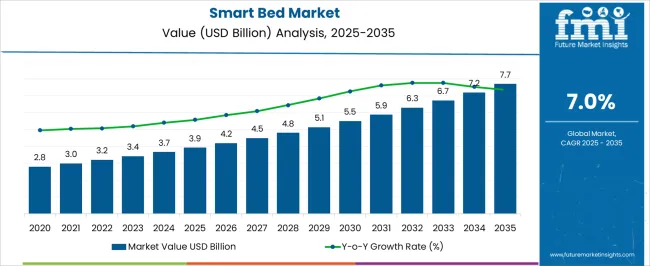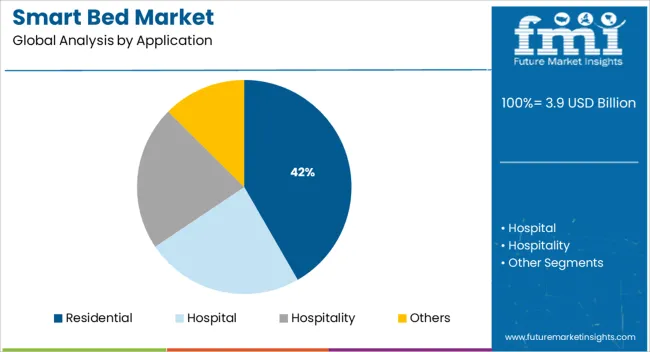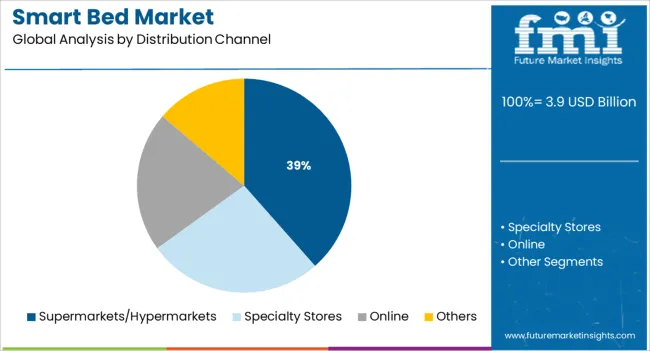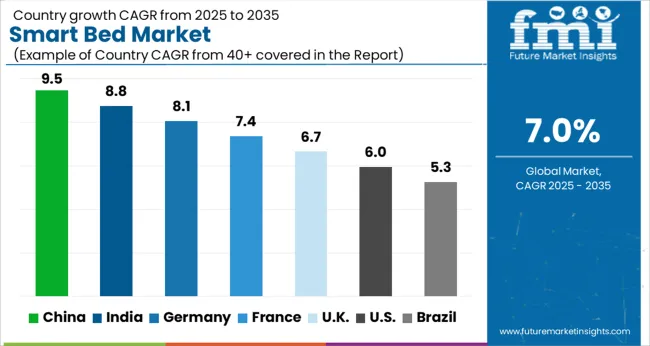The Smart Bed Market is estimated to be valued at USD 3.9 billion in 2025 and is projected to reach USD 7.7 billion by 2035, registering a compound annual growth rate (CAGR) of 7.0% over the forecast period.

| Metric | Value |
|---|---|
| Smart Bed Market Estimated Value in (2025E) | USD 3.9 billion |
| Smart Bed Market Forecast Value in (2035F) | USD 7.7 billion |
| Forecast CAGR (2025 to 2035) | 7.0% |
The smart bed market is advancing steadily, driven by increasing consumer interest in health monitoring, sleep optimization, and connected home ecosystems. Rising awareness around sleep quality and its impact on physical and mental well-being has encouraged the adoption of sensor-equipped, adjustable sleep systems that offer personalized comfort and biometric tracking.
Integration with smart devices and health apps has strengthened appeal, especially among tech-savvy and health-conscious consumers. Additionally, the aging population and increased prevalence of sleep disorders are prompting both medical and consumer sectors to invest in intelligent bedding solutions.
Manufacturers are focusing on combining innovation with luxury, positioning smart beds not only as wellness products but also as lifestyle essentials. The outlook remains strong as developments in artificial intelligence, sleep analytics, and ambient comfort control continue to shape demand across both residential and commercial applications.
The market is segmented by Application and Distribution Channel and region. By Application, the market is divided into Residential, Hospital, Hospitality, and Others. In terms of Distribution Channel, the market is classified into Supermarkets/Hypermarkets, Specialty Stores, Online, and Others. Regionally, the market is classified into North America, Latin America, Western Europe, Eastern Europe, Balkan & Baltic Countries, Russia & Belarus, Central Asia, East Asia, South Asia & Pacific, and the Middle East & Africa.

The residential segment is anticipated to hold 41.70% of the total smart bed market revenue by 2025, making it the leading application category. This dominance is supported by rising demand for sleep enhancing technologies at home, fueled by increasing consumer spending on comfort and personal wellness.
The integration of features such as sleep tracking, temperature regulation, and automatic posture adjustments has enhanced appeal among individuals seeking proactive health management from their living spaces. The popularity of smart home ecosystems has further amplified interest in smart beds as they seamlessly connect with other home automation devices.
This convergence of wellness, convenience, and digital integration continues to strengthen the residential segment’s position in the market.

The supermarkets and hypermarkets segment is projected to account for 38.50% of total market share in 2025 within the distribution channel category, emerging as the leading sales channel. This prominence is attributed to their expansive retail footprint, consumer trust, and the convenience of in-store product interaction.
These outlets provide consumers the ability to physically evaluate smart bed models, enhancing purchase confidence. Competitive pricing, promotional campaigns, and value bundling in physical stores have further driven traction.
Moreover, as consumers continue to seek personalized and immediate retail experiences, supermarkets and hypermarkets are evolving with expanded smart living sections, reinforcing their dominance in the smart bed distribution landscape.
The global demand for smart beds is projected to increase at a CAGR of 7.0% during the forecast period between 2025 and 2035, reaching a total of USD 7.7 Billion in 2035, according to a report from Future Market Insights (FMI). From 2020 to 2025, sales witnessed significant growth, registering a CAGR of 3.7%.
According to Future Market Insights, a market research and competitive intelligence provider, the Smart Bed market was valued at USD 3.9 billion in 2025. Rapid technological changes in the healthcare sector have created a greater demand for smart technologies, including smart beds, in order to improve patient care as well as treatment quality.
Smart hospitals have witnessed significant adoption of automation, digitization, and other technological advancements to deliver greater efficiency in treatment, accelerating the consumption of smart beds to monitor sleep quality and other health factors. The fast-paced technological shift toward care delivery has propelled the demand for advanced products.
Cutting-Edge Sleep Technologies to Fuel the Market Growth
There are a huge number of fresh entrants who are laser-focused on meeting the changing consumer demands globally, and these companies have penetrated the online channels to gain an edge over the competitors in the market. The fast-paced competition has created ample options for consumers to select their products, which has shifted product purchase behavior.
Furthermore, the prominent manufacturers' product innovations have helped the market meet the demand from the hospitality sector. Stryker Corporation, in October 2024, launched a smart bed named 'ProCuity' that comes with smart embedded features and sensors, including Stryker's Secure Connect Technology for smart patient monitoring and to connect to nurse call systems wirelessly.
Increased Smart Home Technology to Accelerate the Market Growth
Rapid developments in technology have inspired consumers to seek new ways to enhance their lifestyles. This has driven the consumer's interest in adopting the latest technologies and smart solutions, which provide a plethora of benefits to the consumers. Increased consumer interest in creating a smart home ecosystem has augmented the consumption requirement for smart home accessories, including smart beds, which is projected to escalate the product demand among residential spaces.
Consumer preferences toward the adoption of smart technology devices across households have played a key role in enhancing the global demand for smart home products. Also, an upsurge in the smart bed requirements from the hospitality sector, including healthcare and luxury hotels, to provide best-in-class facilities in services to customers has propelled the product demand.
Lack of Expertise in Smart Bed Manufacturing to Restrain the Market Growth
A lack of expertise in manufacturing smart beds in various regions is one of the major factors that is expected to limit the growth of the smart bed market over the analysis period. In addition, the low availability of these beds in the stores and lower production rates are other factors that will hinder market growth.
Online Selling of Sub-Standard Products to Limit the Market Growth
The manufacturing and selling of products under different trademarks can harm the image of a brand or company under which the product is being sold. Counterfeiters can enter the distribution channels and sell fake goods, which will affect consumer requirements, thereby hampering product demand. In addition, the rising prevalence of counterfeiters through online channels can play a key role in hampering the smart bed market growth.

Increased Prevalence of Sleep-Related Disorders in the Region to Fuel the Market Growth
The Smart Bed Market in North America is expected to accumulate the highest market share of 23% in 2025. North America is the most lucrative region along with the highest market share. Factors such as the increased prevalence of sleep-related disorders in the USA, that is causing individuals to seek out quality sleep patterns. Moreover, with the growing adoption of the internet in North America, smart home furniture, including smart beds, are becoming increasingly popular, further boosting the sales of smart bed in the region.
Furthermore, chronic diseases, an aging population susceptible to age-related diseases, and high healthcare spending per capita in the region are other major factors that are anticipated to fuel the smart bed market further in the region over the analysis period. The region is expected to hold the highest CAGR of 6.9% during the forecast period.
Increase in Healthcare Expenditure in the Region to Augment the Market Growth
The smart bed market in the Asia Pacific is expected to accumulate a market share value of 21.2% in 2025. The smart bed market is expected to experience the highest market growth in the Asia Pacific, owing to an increase in the healthcare sector expenditure for smart bed installation in developing nations such as India and China.
These smart beds will provide patient data that hospitals can use to enhance the quality of care for the patient. Due to rapid urbanization and the growing purchasing power of the people in China, smart beds are gaining a lot of traction in the region. This is due to the large number of home improvement projects undertaken by consumers.
The Asia Pacific has been driving technology trends across the globe through a digital transformation over the past few years. The region is expected to hold the highest CAGR of 6.8% during the forecast period.
Hospital Segment to beat Competition in Untiring Market
On the basis of power rating, the global Smart Bed market is dominated by the Hospital Segment, which accounts for a share of 32%. Smart beds used in hospitals are majorly focused on improving patient management and helping patients recover better.
The market has gained significant momentum in the healthcare sector, attributed to continuous advancement in smart bed technologies, enabling hospitals to deliver enhanced healthcare service to the patient. The rise in government investments in hospitals to establish the latest technology equipment and smart beds may lucratively boost the market's growth.
Furthermore, the segment escalated to grow rapidly over the analysis period, owing to the shift in patient preference and surge in demand for advanced healthcare facilities. Cardiovascular disorders are expected to boost the demand for smart beds, as these beds are embedded with integrated cardio monitoring sensors and devices that raise the alarm if a patient has a heart attack. The segment is expected to hold a CAGR of 6.9% over the analysis period.
Offline Segment to Drive the Smart Bed Market
Based on the Distribution Channel, the offline segment is expected to witness a significant growth of 30% in 2025, and the trend is expected to continue during the forecast period. The offline channel is expected to lead the global smart beds market segmental share, owing to the rising expansion of retail stores and electronic outlets in emerging countries.
Additionally, consumers favor products from retail branded outlets due to several factors that may range from assistance from in-store salespersons to product testing and demos, which will allow the customers to opt for a better choice before purchase.
Prominent players in the smart bed market are PARAMOUNT BED CO., LTD., ReST, Sleep Number Corporation, Ascion, LLC., Hi-Interiors srl., Ultimate Smart Bed, The BodiTrak, Hill Rom Holdings Inc., Invacare Corporation, Stryker Corporation., among others.
Recent Developments:
| Report Attribute | Details |
|---|---|
| Growth Rate | CAGR of 7.0% from 2025 to 2035 |
| Market Value in 2025 | USD 3.9 billion |
| Market Value in 2035 | USD 7.7 billion |
| Base Year for Estimation | 2025 |
| Historical Data | 2020 to 2025 |
| Forecast Period | 2025 to 2035 |
| Quantitative Units | Revenue in USD Billion and CAGR from 2025 to 2035 |
| Report Coverage | Revenue Forecast, Company Ranking, Competitive Landscape, Growth Factors, Trends, and Pricing Analysis |
| Segments Covered | Application, Distribution Channel, Region |
| Regions Covered | North America; Europe; Asia Pacific; Latin America; Middle East and Africa |
| Key Countries Profiled | USA, Canada, Brazil, Mexico, Germany, United Kingdom, France, Spain, Italy, China, Japan, South Korea, Singapore, Thailand, Indonesia, Australia, New Zealand, GCC Countries, South Africa, Israel |
| Key Companies Profiled | PARAMOUNT BED CO., LTD.; ReST; Sleep Number Corporation; Ascion, LLC.; Hi-Interiors srl.; Ultimate Smart Bed; The BodiTrak; Hill Rom Holdings Inc.; Invacare Corporation; BAM Labs; ArjoHuntleigh AB |
| Customization & Pricing | Available upon Request |
The global smart bed market is estimated to be valued at USD 3.9 billion in 2025.
The market size for the smart bed market is projected to reach USD 7.7 billion by 2035.
The smart bed market is expected to grow at a 7.0% CAGR between 2025 and 2035.
The key product types in smart bed market are residential, hospital, hospitality and others.
In terms of distribution channel, supermarkets/hypermarkets segment to command 38.5% share in the smart bed market in 2025.






Full Research Suite comprises of:
Market outlook & trends analysis
Interviews & case studies
Strategic recommendations
Vendor profiles & capabilities analysis
5-year forecasts
8 regions and 60+ country-level data splits
Market segment data splits
12 months of continuous data updates
DELIVERED AS:
PDF EXCEL ONLINE
Embedded Smart Cameras Market Growth – Trends & Forecast 2023-2033
Smart Vision Processing Chips Market Size and Share Forecast Outlook 2025 to 2035
Smart Touch Screen Scale Market Size and Share Forecast Outlook 2025 to 2035
Smart Magnetic Drive Conveyor System Market Size and Share Forecast Outlook 2025 to 2035
Smart Wheelchair market Size and Share Forecast Outlook 2025 to 2035
Smart Mining Technologies Market Size and Share Forecast Outlook 2025 to 2035
Smart Parking Market Size and Share Forecast Outlook 2025 to 2035
Smart Digital Valve Positioner Market Forecast and Outlook 2025 to 2035
Smart Card IC Market Size and Share Forecast Outlook 2025 to 2035
Smart-Tag Inlay Inserters Market Analysis - Size and Share Forecast Outlook 2025 to 2035
Smart TV Market Forecast and Outlook 2025 to 2035
Smart/AI Toy Market Size and Share Forecast Outlook 2025 to 2035
Smart Locks Market Size and Share Forecast Outlook 2025 to 2035
Smart Sprinkler Controller Market Size and Share Forecast Outlook 2025 to 2035
Smart Indoor Gardening System Market Size and Share Forecast Outlook 2025 to 2035
Smart Building Delivery Robot Market Size and Share Forecast Outlook 2025 to 2035
Smart Watch Market Size and Share Forecast Outlook 2025 to 2035
Smart Label Market Size and Share Forecast Outlook 2025 to 2035
Smart Mat Market Size and Share Forecast Outlook 2025 to 2035
Smart Water Management Market Size and Share Forecast Outlook 2025 to 2035

Thank you!
You will receive an email from our Business Development Manager. Please be sure to check your SPAM/JUNK folder too.
Chat With
MaRIA